-
 Bitcoin
Bitcoin $84,031.4417
-0.74% -
 Ethereum
Ethereum $1,596.6801
-1.63% -
 Tether USDt
Tether USDt $1.0002
0.02% -
 XRP
XRP $2.0987
-1.94% -
 BNB
BNB $581.7684
-0.78% -
 Solana
Solana $127.0194
-2.02% -
 USDC
USDC $1.0001
0.01% -
 TRON
TRON $0.2508
-0.59% -
 Dogecoin
Dogecoin $0.1550
-2.57% -
 Cardano
Cardano $0.6126
-3.55% -
 UNUS SED LEO
UNUS SED LEO $9.3633
-0.55% -
 Chainlink
Chainlink $12.3076
-2.67% -
 Avalanche
Avalanche $19.1640
-5.11% -
 Stellar
Stellar $0.2376
-1.74% -
 Toncoin
Toncoin $2.8601
-0.51% -
 Shiba Inu
Shiba Inu $0.0...01174
-2.57% -
 Sui
Sui $2.1107
-3.68% -
 Hedera
Hedera $0.1576
-5.08% -
 Bitcoin Cash
Bitcoin Cash $318.2720
-2.06% -
 Litecoin
Litecoin $75.9884
-1.33% -
 Polkadot
Polkadot $3.5407
-4.53% -
 Dai
Dai $1.0002
0.02% -
 Bitget Token
Bitget Token $4.2694
-0.29% -
 Hyperliquid
Hyperliquid $15.1315
-3.32% -
 Ethena USDe
Ethena USDe $0.9992
0.01% -
 Pi
Pi $0.6359
-13.36% -
 Monero
Monero $216.7095
-0.03% -
 Uniswap
Uniswap $5.2018
-3.12% -
 OKB
OKB $51.3706
-2.81% -
 Pepe
Pepe $0.0...07005
-4.14%
What are the specific requirements for hardware configuration in IPFS mining?
For efficient IPFS mining, use a quad-core CPU (3 GHz+), 8 GB RAM, 2 TB storage, and a 50 Mbps upload speed; consider SSDs for better performance.
Apr 14, 2025 at 07:50 pm
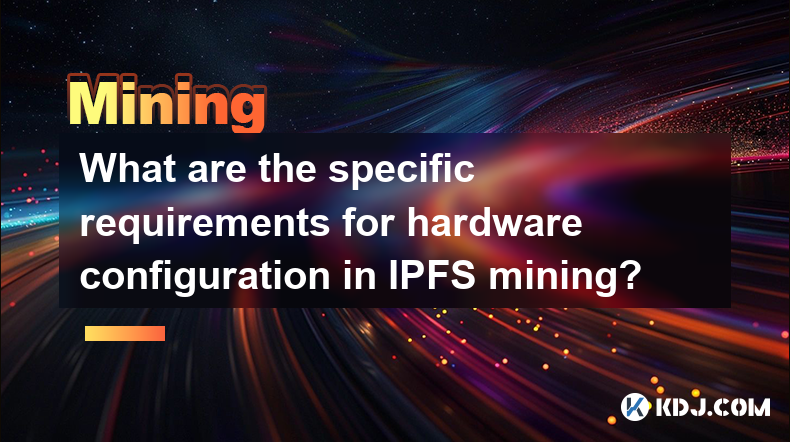
Introduction to IPFS Mining
IPFS (InterPlanetary File System) is a decentralized storage system that allows users to store and share files across a peer-to-peer network. Mining in the context of IPFS refers to the process of contributing storage resources to the network and, in return, earning rewards. For those interested in participating in IPFS mining, understanding the specific hardware requirements is crucial to ensure efficient and effective participation.
CPU Requirements for IPFS Mining
The Central Processing Unit (CPU) is essential for handling the computational tasks involved in IPFS mining. While IPFS mining does not demand high-end CPUs, a reliable and efficient processor can significantly improve performance.
- Minimum Requirement: A dual-core CPU with a clock speed of at least 2 GHz is generally sufficient for basic IPFS mining operations.
- Recommended Specification: For more robust performance, a quad-core CPU with a clock speed of 3 GHz or higher is recommended. This ensures that the system can handle multiple tasks simultaneously without significant slowdowns.
RAM Requirements for IPFS Mining
Random Access Memory (RAM) plays a vital role in the smooth operation of IPFS nodes. Adequate RAM ensures that the system can efficiently manage data and perform necessary operations.
- Minimum Requirement: A minimum of 4 GB of RAM is required to run an IPFS node. This amount can support basic mining activities but may lead to performance issues under heavy load.
- Recommended Specification: 8 GB of RAM or more is recommended for optimal performance. This allows the system to handle larger data sets and perform more intensive mining operations without bottlenecks.
Storage Requirements for IPFS Mining
Storage is perhaps the most critical component for IPFS mining, as the primary function of an IPFS node is to store and share files.
- Minimum Requirement: A minimum of 1 TB of storage is necessary for basic IPFS mining. This allows you to store a reasonable amount of data and contribute to the network.
- Recommended Specification: For more serious miners, 2 TB or more of storage is recommended. This provides ample space for storing larger files and participating more actively in the IPFS ecosystem.
Network Requirements for IPFS Mining
A stable and fast internet connection is essential for IPFS mining, as nodes need to communicate with each other to share and retrieve files.
- Minimum Requirement: A broadband connection with a minimum upload speed of 10 Mbps is necessary. This ensures that data can be uploaded and shared efficiently.
- Recommended Specification: For optimal performance, an internet connection with an upload speed of 50 Mbps or higher is recommended. This allows for faster data transfer and more efficient participation in the network.
Additional Hardware Considerations for IPFS Mining
In addition to the core components, several other hardware considerations can enhance the efficiency and reliability of an IPFS mining setup.
- Power Supply Unit (PSU): A reliable PSU is crucial to ensure that all components receive stable power. A PSU with at least 500 watts is recommended for a typical mining setup.
- Cooling System: Mining operations can generate significant heat, so an effective cooling system is essential. Consider using case fans or even liquid cooling solutions to maintain optimal operating temperatures.
- Redundancy and Backup: For those looking to ensure data integrity and system reliability, consider implementing redundant storage solutions and regular backups. This can help prevent data loss and ensure continuous operation.
Configuring Your IPFS Mining Setup
Setting up your hardware for IPFS mining involves several steps to ensure that your system is optimized for performance and reliability.
- Install the IPFS Software: Begin by downloading and installing the IPFS software from the official website. Follow the installation instructions specific to your operating system.
- Configure the IPFS Node: After installation, configure your IPFS node by setting up your storage directory and adjusting any necessary settings to optimize performance.
- Connect to the Network: Ensure that your IPFS node is connected to the network and can communicate with other nodes. This may involve configuring your firewall and network settings to allow incoming and outgoing connections.
- Monitor and Maintain: Regularly monitor your IPFS node's performance and maintain your hardware to ensure optimal operation. This includes checking storage usage, network connectivity, and system temperatures.
Frequently Asked Questions
Q: Can I use an older computer for IPFS mining?
A: Yes, an older computer can be used for IPFS mining, provided it meets the minimum hardware requirements. However, performance may be limited, and you may need to upgrade components like RAM or storage to achieve better results.
Q: Is it necessary to have a dedicated server for IPFS mining?
A: While a dedicated server can provide better performance and reliability, it is not strictly necessary. A well-configured desktop or laptop that meets the hardware requirements can also be used for IPFS mining.
Q: How does the choice of storage drive impact IPFS mining performance?
A: The type of storage drive can significantly impact performance. Solid State Drives (SSDs) offer faster read and write speeds compared to Hard Disk Drives (HDDs), which can lead to improved mining efficiency. However, SSDs are generally more expensive per gigabyte, so the choice depends on your budget and performance needs.
Q: Can I mine IPFS using a virtual private server (VPS)?
A: Yes, it is possible to mine IPFS using a VPS, provided the VPS meets the necessary hardware requirements. However, you should ensure that the VPS provider allows the necessary network configurations and that the performance is sufficient for your mining needs.
Disclaimer:info@kdj.com
The information provided is not trading advice. kdj.com does not assume any responsibility for any investments made based on the information provided in this article. Cryptocurrencies are highly volatile and it is highly recommended that you invest with caution after thorough research!
If you believe that the content used on this website infringes your copyright, please contact us immediately (info@kdj.com) and we will delete it promptly.
- Bitcoin (BTC) price reaches a daily high of $86429
- 2025-04-16 06:05:13
- Wall Street's Recession Sirens Are Blaring — and Bitcoin's BTC/USD Defiant Rally Has Investors Asking: Is This Digital Gold 2.0?
- 2025-04-16 06:05:13
- Coinbase (COIN) Drops 100+ Crypto Assets from Custody Service
- 2025-04-16 06:00:12
- Mantra (OM) Coin Price is Putting Hope in Investors' Eyes After Crashing 90% Few Days Ago
- 2025-04-16 06:00:12
- Bitcoin (BTC) Just Days Away From Confirming Major Bullish Breakout, Says Crypto Analyst
- 2025-04-16 05:55:12
- USDC (USDC), CCTP v2 and Circle Wallets Will Launch on Monad's Mainnet When It Goes Live
- 2025-04-16 05:55:12
Related knowledge
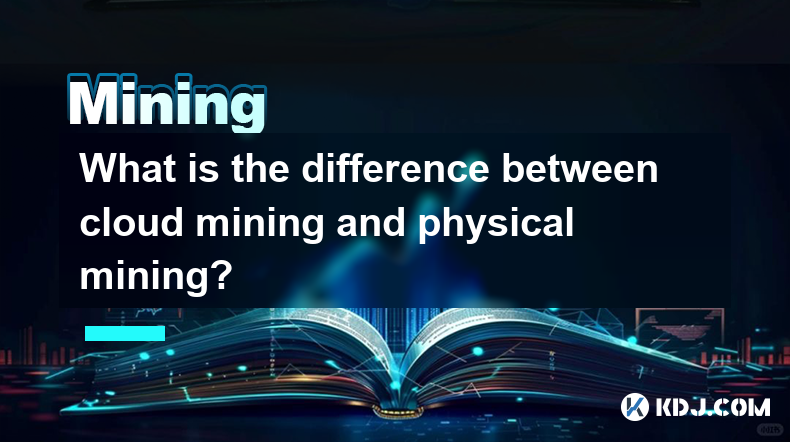
What is the difference between cloud mining and physical mining?
Apr 16,2025 at 01:49am
What is the difference between cloud mining and physical mining? In the world of cryptocurrencies, mining is the process by which new coins are generated and transactions are verified and added to the blockchain. There are two primary methods of mining: cloud mining and physical mining. Understanding the differences between these two approaches can help...
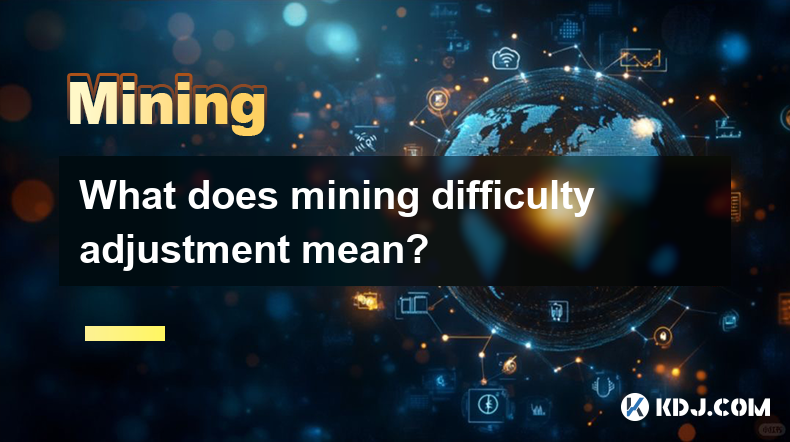
What does mining difficulty adjustment mean?
Apr 16,2025 at 12:42am
What does mining difficulty adjustment mean? Mining difficulty adjustment is a crucial mechanism in blockchain networks, particularly in Proof of Work (PoW) systems like Bitcoin. It ensures that the rate at which new blocks are added to the blockchain remains consistent, despite fluctuations in the total computational power (hash rate) of the network. T...
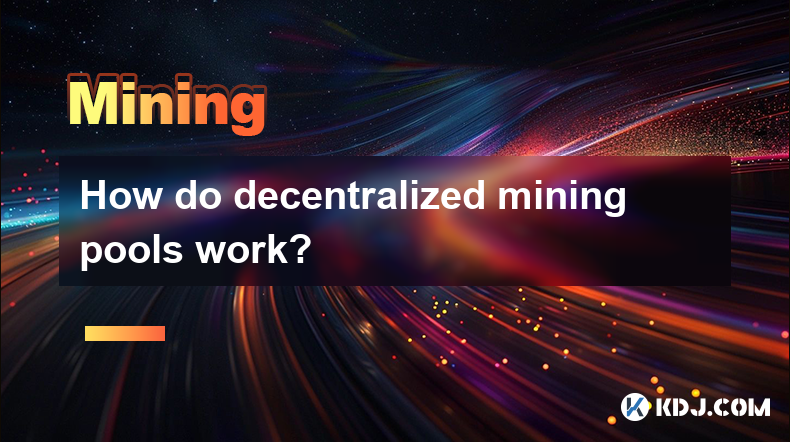
How do decentralized mining pools work?
Apr 16,2025 at 05:42am
Decentralized mining pools represent a significant evolution in the world of cryptocurrency mining, offering a more democratic and transparent approach compared to traditional centralized pools. In this article, we will explore the mechanics of decentralized mining pools, their benefits, and how they operate within the cryptocurrency ecosystem. What are...
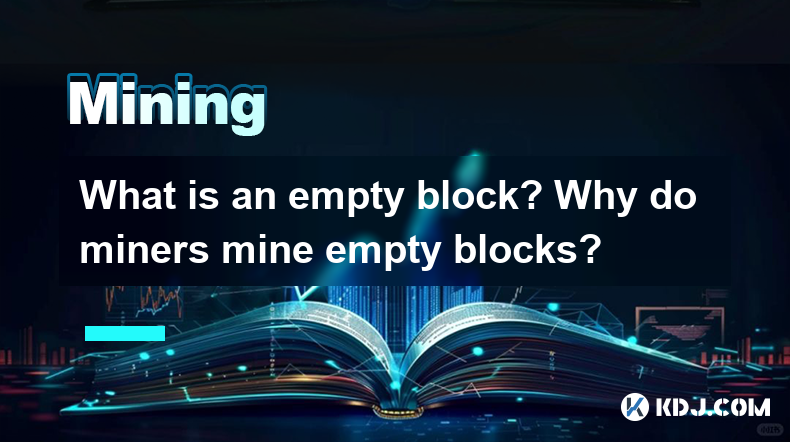
What is an empty block? Why do miners mine empty blocks?
Apr 16,2025 at 01:28am
What is an Empty Block?An empty block in the context of blockchain technology, particularly in cryptocurrencies like Bitcoin, refers to a block that contains no transactions other than the coinbase transaction. The coinbase transaction is a special transaction in which new bitcoins are generated and awarded to the miner who successfully mines the block....
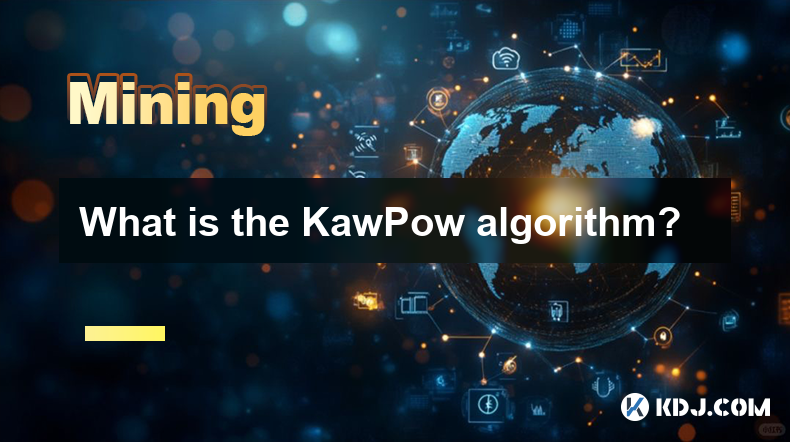
What is the KawPow algorithm?
Apr 16,2025 at 06:43am
The KawPow algorithm is a proof-of-work (PoW) consensus mechanism specifically designed for the Ravencoin blockchain. It evolved from the earlier X16R and X16RV2 algorithms, aiming to enhance the security and efficiency of the mining process. KawPow was introduced to address the issues associated with ASIC (Application-Specific Integrated Circuit) miner...

What is the Bitcoin mining algorithm?
Apr 15,2025 at 08:00pm
What is the Bitcoin Mining Algorithm? Bitcoin mining is a crucial process that maintains the integrity and security of the Bitcoin network. At the heart of this process lies the Bitcoin mining algorithm, which is responsible for verifying transactions and adding them to the blockchain. Understanding this algorithm is essential for anyone interested in t...

What is the difference between cloud mining and physical mining?
Apr 16,2025 at 01:49am
What is the difference between cloud mining and physical mining? In the world of cryptocurrencies, mining is the process by which new coins are generated and transactions are verified and added to the blockchain. There are two primary methods of mining: cloud mining and physical mining. Understanding the differences between these two approaches can help...

What does mining difficulty adjustment mean?
Apr 16,2025 at 12:42am
What does mining difficulty adjustment mean? Mining difficulty adjustment is a crucial mechanism in blockchain networks, particularly in Proof of Work (PoW) systems like Bitcoin. It ensures that the rate at which new blocks are added to the blockchain remains consistent, despite fluctuations in the total computational power (hash rate) of the network. T...

How do decentralized mining pools work?
Apr 16,2025 at 05:42am
Decentralized mining pools represent a significant evolution in the world of cryptocurrency mining, offering a more democratic and transparent approach compared to traditional centralized pools. In this article, we will explore the mechanics of decentralized mining pools, their benefits, and how they operate within the cryptocurrency ecosystem. What are...

What is an empty block? Why do miners mine empty blocks?
Apr 16,2025 at 01:28am
What is an Empty Block?An empty block in the context of blockchain technology, particularly in cryptocurrencies like Bitcoin, refers to a block that contains no transactions other than the coinbase transaction. The coinbase transaction is a special transaction in which new bitcoins are generated and awarded to the miner who successfully mines the block....

What is the KawPow algorithm?
Apr 16,2025 at 06:43am
The KawPow algorithm is a proof-of-work (PoW) consensus mechanism specifically designed for the Ravencoin blockchain. It evolved from the earlier X16R and X16RV2 algorithms, aiming to enhance the security and efficiency of the mining process. KawPow was introduced to address the issues associated with ASIC (Application-Specific Integrated Circuit) miner...

What is the Bitcoin mining algorithm?
Apr 15,2025 at 08:00pm
What is the Bitcoin Mining Algorithm? Bitcoin mining is a crucial process that maintains the integrity and security of the Bitcoin network. At the heart of this process lies the Bitcoin mining algorithm, which is responsible for verifying transactions and adding them to the blockchain. Understanding this algorithm is essential for anyone interested in t...
See all articles























































































